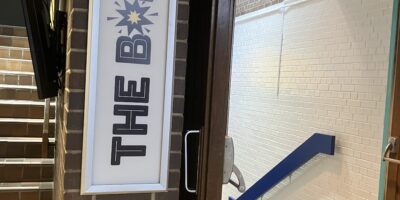Welcome to Issue 2 of The Iron Warrior! This issue is packed with 24 pages of content so there should be something which will spark your interest. My favourite article of the issue goes to ‘The Effect of Cats on the Environment’ by Nina Feng for her interesting take on how those loveable creatures we see on the Internet are really menaces to the natural world. Runners up go to ‘Silicon Nano-Particles Key to Extracting Hydrogen’ by Brian So and ‘Top Places to Study on Campus’ by Wade Wilson and Edward Blake. I’d like to thank my copy editors for their hard work as well as my layout editor, Natasha Phidd, for helping layout half of the paper this past weekend. Thanks and enjoy the issue!
Breaking News: As of Monday February 4, 2013, the Federation of Students (Feds) signed an agreement with the University to take full management control of the Student Life Center (SLC) for compensation of the University’s take-over of Federation (Fed) Hall.
For those of you in first-year, or those who just don’t quite remember the details, Fed Hall is the building north of Ring Road across from the University Club and parking lot M. The building was built in 1984 and paid for entirely by students through an approved fee increase. The building was owned and operated by Feds. Its primary use was a bigger venue to host events which could not fit in the Bombshelter Pub.
In 2003, a fight broke out drawing negative attention by local papers. As a result, concerned citizens demanded the University take action. The Director of Food Services at the time personally shut down Fed Hall and Bomber, only allowing them to open with the administration’s approval. Feds sued the University for $11 million due to license violations, later to settle out of court. In 2004, the new Feds executive was forced to remove the clause in the agreement which prevented the university from reasonably withholding lease renewal.
In 2011, the University was short on space and announced they will not renew the Feds lease on the building. This meant the University took over full control of the building, without any compensation to the students who paid close to $1.5 million to build it in the first place. There were no alternative proposals or options presented with this ‘ultimatum’.
Since 2011, the Feds executive has been working out an agreement with the University to ensure proper compensation is received for the University take-over of Fed Hall.
As of Monday, an agreement was finally reached and signed by both parties making the management change official. Some highlights of the agreement include:
- Full management oversight control of the Student Life Centre.
- A 49-year operating agreement with the ability to renew.
- Limited permissions required from the University of Waterloo for the Federation of Students to improve the Student Life Centre.
- The removal of University vending machines once the Federation of Students starts to operate the Student Life Centre, and control of a 24 hour convenience outlet.
- The ability to negotiate and redistribute all leases within the building once the term is over in order to meet the needs of students.
More details regarding the agreement and operation of the SLC will be released in the next few weeks.
With this agreement comes the end of a two year battle with administration spanning two executive teams which consumed hundreds of hours and dollars just to come to a consensus. Was it really worth it? For me, it is a 60% yes.
Although Fed Hall was a building paid for by students, I think it has been underutilized the past few years. Some of the major events which occur in Fed hall on a regular basis are Orientation Week events, Frost Week concerts, and the famous SciBall. Although this may seem like a huge detriment to those involved in running these events to lose Fed Hall, the University still allows students to book out the space if required. Although it comes at a much higher price than before, the building has not been lost entirely (yet). It is expected that the University will be renovating Fed hall to accommodate offices for Food Services, most likely eliminating student access to the second floor of the building. However it has been stated that the open space on the main floor will remain intact for student use, but also for external bookings such as weddings, receptions, and conferences.
Although students will slowly be fazed out of Fed Hall access, we have potentially gained more by Feds taking over the SLC. Feds now has secured management in a central student hub on campus which students do use on a daily basis. To go from a building used by students 4-12 times a year to one that is used every day is a huge upgrade in the short term perspective.
With the agreement, Feds can now make changes to the makeup of the SLC, whereas before it was either extremely time consuming if not impossible. This is one of the major benefits to the agreement. The SLC Management Board consisted of both University staff and student representatives. Normally the students on the board would create a majority in any decision, however with busy schedules, many members did not always attend, shifting the opinion to favour that of the University, making it very difficult for things to get passed. With the new agreement, this board will no longer exist, eliminating a huge hurdle for approvals.
Although Feds will have a much easier time making changes within the SLC, what do they actually have the power to change? As it stands, the major University owned services in the building are the Housing Office, Watcard Office and Campus Tech store on the basement floor. There are also numerous external companies such who have leases with the SLC such as SOS Physiotherapy and Campus Dentist. Once these lease agreements come up for renewal, Feds now has full control as to if they will be renewed. Feds can choose to not sign a renewal agreement should there be a need for more space for Feds and students. This is a huge advantage in the long run; however its benefits will likely not be seen in many years, depending on how long the original lease contracts were set for.
One of the major discussion items that will come from this agreement will involve the food venues in the SLC. As it stands, the University owns all food operations in the SLC except Wasabi, Campus Bubble, Federation Xpress, and the Bombshelter Pub. The University venues have full control of their current space as it stands as the addition to the building in which they are located was paid for entirely by the University. There are also other agreements in place which prevent Feds from opening businesses which would compete directly with Waterloo Food Services, therefore allowing them to maintain their for-profit monopoly on campus. If there are any voids in what food services offers, Feds will have a much easier time getting the venue set up in the SLC, however it will still require many approvals from the University.
After going through all of these options, in my opinion, not a lot has changed with how Feds will run the SLC. Feds will still run the same services they have before; they can’t change what is currently being operated in the building until the lease agreements come up for renewal, and any major changes to food venues still require a full University approval. So is this really good compensation for the $1.5 million students invested into Fed Hall? I’m not so sure. If Feds can readjust how they operate their services in the SLC to reduce overhead cost and boost profits to earn back the $1.5 million in student fees lost with Fed Hall, then I will be more satisfied with the agreement. However, this is not likely to happen anytime soon, especially with an executive team whose goals for the organization change yearly as new people take on the roles. I think the University was able to get away unscathed with this agreement. They were able to take over a full building they never had access to before, by giving up a small amount of control in how the SLC is managed. Only time will tell if this agreement was worthwhile, but at the present, I feel the University took better advantage of the situation.




Leave a Reply